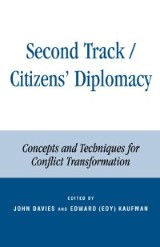Details

Second Track Citizens' Diplomacy
Concepts and Techniques for Conflict Transformation|
59,99 € |
|
| Verlag: | Rowman & Littlefield Publishers |
| Format: | EPUB |
| Veröffentl.: | 06.05.2003 |
| ISBN/EAN: | 9781461643302 |
| Sprache: | englisch |
| Anzahl Seiten: | 328 |
DRM-geschütztes eBook, Sie benötigen z.B. Adobe Digital Editions und eine Adobe ID zum Lesen.
Beschreibungen
Almost all current wars are primarily intra-state, involving complex societal conflicts with at least one party a non-state community. Second Track/ Citizens' Diplomacy is broadly defined as facilitated dialogue to address conflict issues between unofficial representatives or equivalent opinion leaders dfrom communities in conflict. It is an essential complement to official (first track) diplomacy for responding to the enormous challenge that these complex conflicts pose to building a sustainable and dynamic peace. In this volume, prominent contributors explain the development, theory and current practice of second track diplomacy. They examine the dynamics of modern complex conflicts, such as those in Sri Lanka, Israel/Palestine, Cyprus, or the Caucasus. Exploring innovative problem-solving methodologies, the book provides a detailed program for guiding 'Partners in Conflict' in the search for common ground and analyzes core issues that arise in the practice and evaluation of second track diplomacy. This book will be valuable to both academics and professionals involved in first or second track diplomacy, or interested in integrative methods of dispute resolution or conflict prevention, as well as to those working in development, peace-building or humanitarian programs at any phase of the conflict cycle.
In this volume, prominent contributors explain the development, theory, and current practice of second track diplomacy. They examine the dynamics of modern complex conflicts, such as those in Sri Lanka, Israel/Palestine, Cyprus, and the Caucasus. Exploring innovative problem-solving methodologies, the book provides a detailed program for guiding 'partners in conflict' in the search for common ground and analyzes core issues that arise in the practice and evaluation of second track diplomacy. This book will be valuable to both academics and professionals involved in first or second track diplomacy, or interested in integrative methods of dispute resolution or conflict prevention, as well as to those working in development, peacebuilding or humanitarian programs at any phase of the conflict cycle.
Chapter 1 Second Track Diplomacy: An Overview
<br>Part 2 Part I: Conflict Dynamics and the Evolution of Second Track Diplomacy
<br>Chapter 3 Protracted Social Conflicts and Second Track Diplomacy
<br>Chapter 4 Dynamics and Management of Ethnopolitical Conflicts
<br>Chapter 5 The Need for Multi-Track Diplomacy
<br>Chapter 6 Historical Mapping of the Field of Interactive Conflict Resolution
<br>Part 7 Part II: Strategies for Conflict Transformation and Peace Building
<br>Chapter 8 Interactive Problem Solving as a Tool for Second Track Diplomacy
<br>Chapter 9 Power, Rights, Interests, and Identity: Conflict Management Strategies for Building a Democratic Peace
<br>Chapter 10 Mapping Cultures: Strategies for Effective Intercultural Conflict Resolution
<br>Chapter 11 Reconciliation in Post-Conflict Peace Building: Lessons Learned from South Africa
<br>Part 12 Part III: The Innovative Problem Solving Workshop
<br>Chapter 13 Sharing the Experience of Citizens' Diplomacy with Partners in Conflict
<br>Chapter 14 Toward Innovative Solutions
<br>Part 15 Part IV: Capacity Building and Action Evaluation
<br>Chapter 16 Building Capacity for JustPeace: Design, Implementation and Evaluation of Training Programs
<br>Chapter 17 Action Evaluation for Conflict Management Organizations and Projects
<br>Chapter 18 References
<br>Part 2 Part I: Conflict Dynamics and the Evolution of Second Track Diplomacy
<br>Chapter 3 Protracted Social Conflicts and Second Track Diplomacy
<br>Chapter 4 Dynamics and Management of Ethnopolitical Conflicts
<br>Chapter 5 The Need for Multi-Track Diplomacy
<br>Chapter 6 Historical Mapping of the Field of Interactive Conflict Resolution
<br>Part 7 Part II: Strategies for Conflict Transformation and Peace Building
<br>Chapter 8 Interactive Problem Solving as a Tool for Second Track Diplomacy
<br>Chapter 9 Power, Rights, Interests, and Identity: Conflict Management Strategies for Building a Democratic Peace
<br>Chapter 10 Mapping Cultures: Strategies for Effective Intercultural Conflict Resolution
<br>Chapter 11 Reconciliation in Post-Conflict Peace Building: Lessons Learned from South Africa
<br>Part 12 Part III: The Innovative Problem Solving Workshop
<br>Chapter 13 Sharing the Experience of Citizens' Diplomacy with Partners in Conflict
<br>Chapter 14 Toward Innovative Solutions
<br>Part 15 Part IV: Capacity Building and Action Evaluation
<br>Chapter 16 Building Capacity for JustPeace: Design, Implementation and Evaluation of Training Programs
<br>Chapter 17 Action Evaluation for Conflict Management Organizations and Projects
<br>Chapter 18 References
John L. Davies is co-director of the Partners in Conflict Project and senior research associate at the Center for International Development and Conflict Management, University of Maryland. He is a recent Board Member of the Forum on Early Warning and Early Response and consultant to the U.S. governmentOs State Failure Task Force. Edward (Edy) Kaufman is the executive director of the Harry S. Truman Institute for the Advancement of Peace, the Hebrew University of Jerusalem, and senior research associate (and former director) of the Center for International Development and Conflict Management, University of Maryland.

















